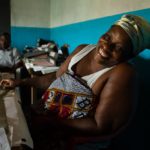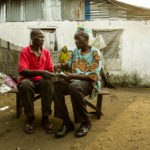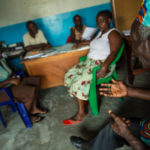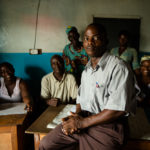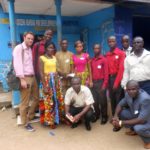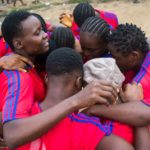Creating Community Justice Teams in
Liberia’s Largest Slums
Winner’s Citation:
The Namati staff who shortlisted Accountability Lab for the judges really admired this very sustainable, self-funded program in Liberia. They believe that it is scaleable and well-placed to develop with an extensive corps of mediators working in slum communities in Monrovia that are hard pressed for justice services.
Background to the project.
Download a case study that illustrates Accountability Lab’s work.
There is presently an absence of war in Liberia, but that does not imply the existence of peace. A fundamental lack of justice in Liberia undermines trust between citizens and government, reinforces inequality and fosters insecurity. In the eyes of ordinary Liberians, the use of conventional legal systems such as the courts and police are often expensive, time-consuming, and culturally alien. When an aggrieved party is unable to meet the financial costs associated with the justice system, justice itself is delayed or denied. As one citizen pointed out to Accountability Lab recently: “There is simply no justice for the poor.”
At the same time, citizens in urban areas do not have a functional or accessible platform to resolve disputes at the community level, where traditional, customary dispute resolution systems have become corrupted and eroded over time. As a result, many people resolve their grievances through violent means. Such failures are a recipe for conflict and social discontent in a country that has already suffered decades of misrule and a tragic 14-year civil war. More effective, creative informal legal tools – including community-based systems – can play a critical role in providing justice and building peace in Liberia.
- Community Justice Team member, West Point, Monrovia, Liberia. Photo by Morgana Wingard © Accountability Lab.
- Daniel D. Tweh, the town cryer for the Community Justice Team, West Point, Monrovia, Liberia. Photo by Morgana Wingard © Accountability Lab.
- Community Justice Team, West Point, Monrovia, Liberia. Photo by Morgana Wingard © Accountability Lab.
- Thomas Tweh, leader of the Community Justice Team in West Point, Monrovia. Photo by Morgana Wingard © Accountability Lab.
- Accountability Lab’s Blair Glencorse with members of the Community Justice Team in Logantown, Monrovia, Liberia. Photo © Accountability Lab.
- Community Justice Team Peace and Justice Tournament, Monrovia, Liberia. Photo by Jim Tuttle © Accountability Lab
Using grassroots legal advocates to address the problem.
Accountability Lab believes that building the capacity of community members to solve disputes in their communities is the best way to build the rule of law and promote peace in Liberia as a foundation for social and economic development. Through the Community Justice Teams (CJTs), the Lab has provided training, mentoring, networking, management support and seed funding to community mediators in West Point and Logan Town, two of the largest slums in Monrovia with over 150,000 combined inhabitants. Each CJT team consists of seven to eight community volunteer mediators, who bring together parties to resolve disputes in equitable ways. The mediators are drawn from all age, gender, geographical and ethnic groups to ensure equity and fairness. The system is free and functions 24/7, with each case carefully documented through written records taken by a trained notary. Awareness of the service is raised through a town crier, local radio, and outreach efforts by the CJTs themselves.
Accountability Las has observed in the two target communities that aggrieved parties are more responsive to non-binding mediation and engage in more constructive dialogue without the threat of formal legal sanction that inherently arises in governmental courts. This builds trust and the bonds of understanding that prevent and mitigate larger issues of insecurity in these areas. At the same time, formal justice systems are supported because the CJTs work closely with local courts and police departments to refer cases back down to locally trained justice mediators. This unblocks the courts, reduces corruption and improves the speed of resolutions – and saves citizens time, money and effort. The outcome is a legitimate grassroots process that merges formal and informal tools for justice and accountability in a manner that is seen to be fair and equitable by the communities themselves.
What difference did it make?
The Accountability Lab’s Community Justice Teams (CJTs) have transformed the dynamics of conflict response in some of Monrovia’s most densely-populated, low-income,and conflict prone slums. In the past year, the CJTs have resolved over 150 cases without any recidivism and with the full cooperation of all parties in two of the most difficult neighborhoods of Monrovia, renowned for insecurity and the absence of the rule of law. The impact of this work is felt at three levels.
At the individual level, these efforts save citizens time and money. This project is small, but for a total investment of around $4,000, the CJTs have saved citizens more than $9,000 in bond, administrative, and travel fees, and approximately 350 days of time that they otherwise would have spent navigating a confusing court system. This has allowed them to focus on what is important in their lives – like earning money to feed their family and educate their children.
At the community level, these efforts have brought the people of West Point and Logan Town together, building a sense of community around a shared awareness of their rights and responsibilities; and of the role that law plays in their lives. The program has boosted social cohesion, helping families and neighbors live together in peace. Individuals who may have been sentenced to jail time or suffered severe financial hardship using the formal justice channels have been spared through the application of justice aligned with contextually-specific norms and values. As one resident of West Point told Accountability Lab during the height of Ebola-related violence in August 2014: “The CJT was very helpful in talking to all of us to encourage us to peacefully approach the situation; the Center was always concerned with promoting a non-violent approach.”
At the institutional level, the design of this project has empowered grassroots legal advocates to resolve disputes informally, while also supporting and facilitating the formal justice system. The informal bonds across institutions proved critical in West Point during the recent Ebola outbreak, when the army violently enforced a quarantine in the community. As a result of the trust built through this program, the CJT team in West Point was chosen as a key point of contact for collaboration with the government and international donors during this period. Citizen grievances were handled and the stand-off was eventually resolved. Since then the CJTs have mediated over 70 additional Ebola-related disputes, on issues ranging from allocation of ration cards to the care of orphans. The trust, authority and perception of fairness the CJTs demonstrated were essential to avoiding more widespread violence and are now critical to re-building the legitimacy of governance.
What advice would you give to others running such a program?
Accountability Lab says: “There are a number of lessons that can be learned from our experience with the CJTs in Liberia. First, it is essential to listen carefully and spend significant amounts of time in any community before beginning work. This provides the opportunity to truly understand conceptions of justice, build trust and identify key individuals with whom to work. We spent almost a year in West Point listening and engaging in conversations around these issues before beginning any work on the project, and that proved critical over time. This also allows any rule of law initiative to design for context and avoid the mistakes of the past. Other mediation efforts had taken place on a sporadic basis in West Point, for example, but only during weekday daylight hours – while most disputes occur in the evenings and on the weekends- so our CJTs are available 24/7.
Second, it is important to embrace potential failure and pivot when the project may not be producing the desired results. The CJTs were an idea that grew from the communities themselves, but the mediators experienced early difficulties in explaining the need for the CJTs to the larger communities. In this initial period, very few people were using the service. However, after brainstorming with the group, we developed a communication strategy that provided a basic understanding of what we do, in a way that fitted local context. We realized, after careful observation and through feedback from community members, that the best way to communicate our services was to employ a respected town crier in the community. We have also deepened the sophistication of our approach to emphasize outreach through community radio programs. The mediation team in Logan Town frequently appears on a community radio station and holds regular community meetings.
Third, we learned that sustainability is key to ensure enduring results and move away from dependence on external sources of funding. From the outset, the program has been designed with a long-term horizon in mind in terms of both financial and organizational sustainability. After our initial investment of funds, each of the CJTs is now in the process of raising their own revenue from communities to continue their services. A recent community meeting in Logan Town led to spontaneous pledges of over $10,000 Liberian dollars. Secondly, we have supported the CJTs to build the systems and teams necessary to operate on a low-cost basis over time- through significant amounts of training, mentoring and support, all sourced within Liberia.
Finally, the progress made and the networks of the CJTs has ensured financial support from the Ministry of Internal Affairs which is a first step towards collaboration with the government and coordination with the larger formal justice system over time. Discussions are now ongoing with the Ministry of Justice and the Justice and Peace Commission on how sustainability of the CJTs can be assured and expanded to additional communities going forwards.”


